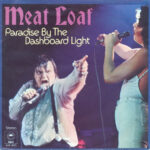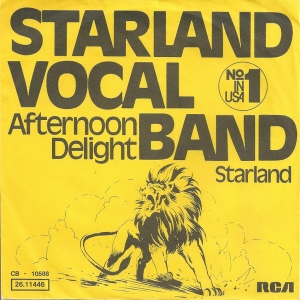 “Paradise by the Dashboard Light” by Meat Loaf is more than just a song—it is a theatrical rock opera that captures the highs and lows of teenage romance with bombast, humor, and raw emotion. Released in 1977 as part of Meat Loaf’s landmark album Bat Out of Hell, the track stands as one of the most ambitious and memorable songs in rock history. It combines storytelling, dynamic performances, and innovative musicality to create a narrative that is both relatable and larger-than-life. The song’s dramatic shifts in tone and its vivid portrayal of youthful passion and regret have secured its place as a beloved classic, influencing generations of musicians and captivating listeners with its unforgettable journey.
“Paradise by the Dashboard Light” by Meat Loaf is more than just a song—it is a theatrical rock opera that captures the highs and lows of teenage romance with bombast, humor, and raw emotion. Released in 1977 as part of Meat Loaf’s landmark album Bat Out of Hell, the track stands as one of the most ambitious and memorable songs in rock history. It combines storytelling, dynamic performances, and innovative musicality to create a narrative that is both relatable and larger-than-life. The song’s dramatic shifts in tone and its vivid portrayal of youthful passion and regret have secured its place as a beloved classic, influencing generations of musicians and captivating listeners with its unforgettable journey.
From its opening moments, “Paradise by the Dashboard Light” sets a cinematic stage, inviting listeners into a world of adolescent yearning and the thrill of young love. The song unfolds as a dialogue between a young couple, capturing the excitement, confusion, and pressure that define the experience of growing up and exploring intimacy. The “dashboard light” itself becomes a metaphor for temptation, innocence, and the pivotal moments that can change the course of one’s life.
Musically, the track is a tour de force, blending rock, pop, and theatrical elements into a cohesive narrative. Composed by Jim Steinman, who was Meat Loaf’s longtime collaborator and creative force behind Bat Out of Hell, the song showcases Steinman’s flair for dramatic, operatic storytelling. The instrumentation ranges from driving guitar riffs and pounding drums to lush piano melodies and soaring vocals, creating an epic soundscape that mirrors the emotional rollercoaster of the story.
The song’s structure is unconventional, consisting of several distinct sections that shift seamlessly between the characters’ perspectives and moods. It begins with an upbeat, flirtatious exchange as the young couple talks about their desires and intentions. This segment captures the innocence and optimism of youth, with Meat Loaf’s powerful vocals conveying excitement and hope. The interplay between Meat Loaf and Ellen Foley, who provides the female vocals, adds a dynamic tension that brings the characters’ emotions to life.
One of the most iconic moments in the song is the “baseball play-by-play” section, performed by New York disc jockey Phil Rizzuto. This unexpected and humorous interlude uses the metaphor of a baseball game to describe the physical intimacy unfolding between the couple. The play-by-play commentary adds a layer of levity and cultural reference, turning a private moment into a public spectacle and highlighting the mix of innocence and bravado characteristic of teenage encounters. This segment is widely celebrated for its creativity and has become one of the defining features of the track.
As the song progresses, the mood darkens and becomes more introspective. The initial excitement gives way to doubt and realization as the male character grapples with the consequences of his promises. The lyrics “I gotcha, and I don’t want to let go” reveal a complex mix of desire, fear, and responsibility. This shift captures the tension between youthful impulsiveness and the realities of adulthood, making the song resonate beyond its narrative context.
“Paradise by the Dashboard Light” is not just a story of teenage romance but also a commentary on the societal pressures and expectations surrounding love, sex, and commitment. The dialogue format allows listeners to witness the negotiation and power dynamics between the characters, reflecting broader themes of communication and misunderstanding in relationships. The song’s length and complexity defy typical radio formats, yet its popularity demonstrates the appetite for storytelling that challenges conventions.
The production of the track is grand and meticulously crafted, with each instrument and vocal part carefully placed to enhance the drama. The backing vocals and harmonies enrich the texture, while the guitar solos and rhythmic shifts maintain momentum and intensity. Steinman’s influence is evident in the song’s operatic flair and cinematic scope, creating a piece that feels more like a mini-musical than a standard rock song.
The vocal performances are central to the song’s impact. Meat Loaf’s delivery is passionate and raw, capturing the exhilaration and vulnerability of his character. Ellen Foley’s vocals provide a perfect counterbalance, conveying innocence, assertiveness, and emotional complexity. Their chemistry brings authenticity to the narrative, allowing listeners to empathize with both perspectives.
The song’s themes of desire, consequence, and the passage from youth to adulthood have universal appeal. While rooted in the specific context of 1970s America, its exploration of love and commitment transcends time and culture. The tension between freedom and responsibility, hope and regret, speaks to fundamental human experiences that continue to resonate.
“Paradise by the Dashboard Light” also reflects the influence of musical theater on rock music. Its storytelling approach, dramatic shifts, and character-driven lyrics draw from the traditions of Broadway and opera, blending them with rock’s energy and edge. This fusion helped pave the way for future concept albums and rock operas, influencing artists across genres.
The song’s cultural impact extends beyond music. It has been referenced and parodied in films, television, and stage productions, becoming a symbol of youthful passion and the complexities of relationships. Its length and theatricality make it a favorite for live performances, where its energy and drama can be fully realized.
Despite its epic scale, the song maintains an intimacy that connects deeply with listeners. The conversational lyrics and relatable emotions invite audiences to see themselves in the story, whether reminiscing about their own youthful experiences or contemplating the challenges of love and commitment.
“Paradise by the Dashboard Light” also showcases the creative synergy between Meat Loaf and Jim Steinman. Their collaboration resulted in a unique sound and storytelling style that set Bat Out of Hell apart from other albums of its time. The success of the song contributed to the album’s status as one of the best-selling rock albums ever, and it remains a highlight of Meat Loaf’s live shows.
The track’s length—over eight minutes—defied conventional expectations for singles, yet it became a staple on radio and MTV, proving that audiences were hungry for ambitious, narrative-driven music. Its success challenged industry norms and demonstrated the power of combining storytelling with rock’s intensity.
The song also explores the theme of promises and their consequences. The male character’s realization that “this night is gonna last me all my life” captures the weight of decisions made in moments of passion. This narrative thread adds depth and complexity, transforming what might have been a simple love song into a meditation on commitment and regret.
The musical transitions throughout the song reflect the changing emotions of the characters, moving from playful flirtation to urgent desire to somber reflection. These shifts keep the listener engaged and underscore the storytelling, making the song an immersive experience.
“Paradise by the Dashboard Light” remains a cultural touchstone for many fans who connect with its portrayal of love’s excitement and challenges. Its enduring popularity is a testament to its emotional honesty, musical innovation, and theatrical flair.
In conclusion, “Paradise by the Dashboard Light” by Meat Loaf is a groundbreaking rock opera that captures the essence of teenage desire, love, and the complexities of commitment. Its ambitious structure, dynamic performances, and vivid storytelling have made it a timeless classic that continues to captivate audiences. The song’s blend of humor, drama, and raw emotion creates a rich narrative experience that transcends the typical rock song, securing its place in the pantheon of great musical storytelling. Through its epic journey, “Paradise by the Dashboard Light” invites listeners to reflect on the passion and pitfalls of love, making it a powerful and unforgettable anthem for generations.


